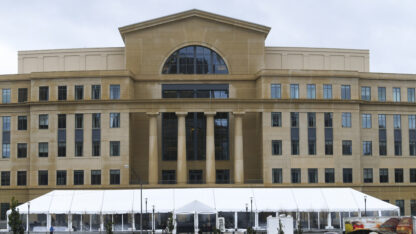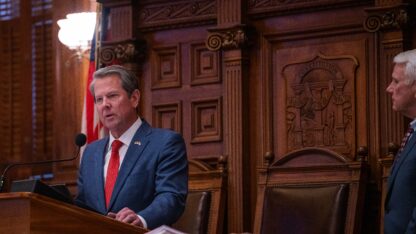How Georgia’s Environment Fared Under The Gold Dome

Georgia’s legislative session ended last week, and now many of the bills that passed are waiting for Gov. Nathan Deal’s signature.
So how did the environment fare this legislative session?
“It wasn’t nearly as bad as it could have been,” Sierra Club lobbyist Neill Herring said.
Clean Water
First, a change that Herring spoke out against. The Georgia Soil and Water Conservation Commission monitors runoff from farms and construction sites. A bill passed that takes away its independence ─ it will be “administratively attached” to the Department of Agriculture. This is consistent with a move that Deal suggested in his budget proposal.
Other changes included: opening up the agency’s commission to anyone the governor chooses and giving final approval of the agency’s construction runoff guidelines to a different board.
“If the economy continues this pattern of recovery, and there’s more development, we’re going to see more mud in the streams than we would have seen if this hadn’t happened, or that would be my expectation,” Herring said. “And more mud running onto other people’s property.”
Another water-related bill clarifies the rules on construction along salt marshes. In order to protect the marsh, buildings have to be constructed 25 feet back from the marsh itself.
An earlier version of the bill allowed a few exemptions. Projects with permits from the Army Corps of Engineers would have been exempt from the rule, and any project that created some kind of stabilization along the marsh – a pile of rocks for instance – would have been exempt. These exemptions were removed by the time the bill was passed.
Green Building and Renewable Energy
While the two previous bills touch on construction, there are two more on that topic.
It will be easier for homeowners and businesses to install solar panels under a bill heading to the governor’s desk that would allow financing for solar panels.
“There’s companies out there that will be able to provide the financing for the homeowner,” Sen. Steve Gooch, R-Dahlonega, said.
So that means more renewable energy, more affordably.
Another bill would effectively ban state buildings from pursuing LEED certification, a common green building standard.
It’s because LEED doesn’t consider most Georgia lumber to be sustainable. Even though local builders who use wood from Georgia would still get LEED credit for using local materials, the bill’s backers said the standard is biased against local lumber.
So the bill says that state-owned buildings can only use green standards that do judge Georgia lumber as sustainable. Thus, no more LEED.
Plastic
Some places in Georgia, including Athens and Tybee Island, have tossed around the idea of banning or placing a fee on plastic grocery bags. That would be confusing, said supporters of a bill that would have banned plastic bag bans.
That ended up creating a discussion not only about the environmental drawbacks of bags that never biodegrade and that can hurt wildlife, but also about local control. In the end, it failed, and cities retain the right to ban plastic bags.
9(MDAxODM0MDY4MDEyMTY4NDA3MzI3YjkzMw004))






